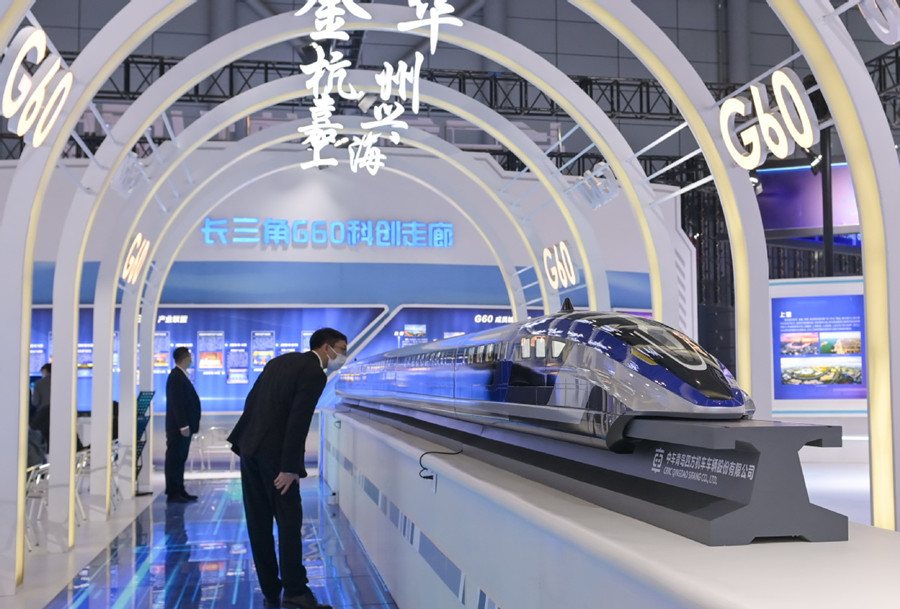Integration accelerated for Yangtze River Delta with raft of fresh moves

A maglev train model on show during an expo in Hefei, Anhui province. [Photo/Xinhua]
Shanghai and its neighboring provinces of Jiangsu and Zhejiang, along with Anhui province, have jointly announced a batch of new projects and policies to accelerate integration of the Yangtze River Delta region, which was elevated to a national strategy in 2018.
A series of cooperation projects and framework agreements were unveiled during a forum on Wednesday as senior officials, scholars and entrepreneurs from Shanghai, Jiangsu, Zhejiang and Anhui gathered to realize regional integration of the delta. The move is set to further promote regional connectivity and ease administrative barriers to unleash greater vitality in China's major economic powerhouse.
Among the projects are an alliance of companies and research institutes aimed at promoting carbon neutrality, and a network of smart bank terminals that provide cross-provincial public services.
Bao Xinhe, an academician at the Chinese Academy of Sciences, said the new alliance will help boost development of new energy in the delta.
"Past industrial revolutions were all related to shifts in energy consumption. The Yangtze River Delta, whose regional GDP accounts for nearly a quarter of the country's total, should lead the replacement of fossil fuel energy with renewables to contribute to the country's goal of reaching carbon neutrality," Bao said.
Bao also said the new alliance can guide research on more efficient solar panels and hydrogen energy storage modalities, as well as the application of low-carbon technologies in the production of steel and cement, which make up a large portion of the region's total carbon emissions.
Huang Dinan, chairman of the board of Shenergy Group, a member of the alliance, said the company has invested in hydrogen energy industrial chains since 2019, and plans to build a network of hydrogen fueling stations in the delta by 2030.
"By joining the alliance, we hope to work together with partners in the delta and contribute more carbon-zero energy to the country's development," Huang said.
As for improving convenience for the public in dealing with administrative matters, such as household registrations for newborns and cross-provincial reimbursement applications for healthcare fees, the nation's top commercial lenders, including Bank of China, Bank of Communications and Industrial and Commercial Bank of China, have worked with local governments to incorporate public e-portals into the banks' networks of smart terminals in the delta.
A total of 11,940 branches of the banks in the region are now equipped with such smart terminals, providing around 100 e-government services.
Gao Gan, vice-president of the Yangtze River Delta Management Headquarters of Bank of Communications, said that by leveraging the large network of banks, the government can bring more convenience to the public.
"Riding on the national strategy of the region's integration, banks have also broken through some bottlenecks in their own systems of providing financial services across different provinces. The synergies of banks and governments will continue to bring benefits to businesses and residents in the region," Gao said.
Officials also signed a framework agreement on pushing forward the construction of a new rail line linking Nanjing, capital of Jiangsu province, with Hangzhou, Zhejiang's provincial capital, as well as Anhui province.
Lu Ming, distinguished professor of economics at Shanghai Jiao Tong University, said transportation infrastructure, which has been built or is under construction in the region, is very important in forming closer ties among city clusters in the delta region.
"Right now the radius of the city clusters in the delta is still too big. A dense network of rail transportation linking small cities around provincial capitals will stimulate better allocation of populations, industry and capital," Lu said.
Memorandums of cooperation for regional agricultural matters between Shanghai and the three provinces were also signed during the forum. Agreements to build a public resources transaction platform and a fund supporting industrial chains in the delta were inked by local governments and investment groups.
























